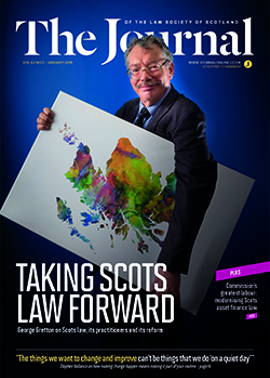Disability: a new focus

If ever we needed reminding of the fact that lawmaking is a slow process, further evidence has arrived in the shape of a recent consultation from the Scottish Government on the important topic of disabled persons. Even those who pride themselves on keeping up to date with the Byzantine changes to licensing legislation may be forgiven for having overlooked s 179 of the Criminal Justice and Licensing (Scotland) Act 2010, given that it received Royal Assent in August 2010.
Its effect will be to alter the requirements of s 20 of the 2005 Act, relating to the documentation to be submitted with an application for a new premises licence. Following an amendment to the Premises Licence (Scotland) Regulations 2007, a disabled access and facilities statement will require to be lodged along with the operating plan and layout plan. Failure to submit such a statement will not be a ground for refusal, but it will mean that an application may not be considered by a licensing board.
Scope of the duty
Draft guidance has been issued. It is likely that the changes will be implemented in the spring. While the substantive law on disability, contained in the Equality Act 2010 (“EA”), will remain unchanged, it is inevitable that it will be exposed to renewed scrutiny. Anyone advising a client on a proposed new project would be well advised to be aware of the forthcoming change. It might be useful to review the three main requirements of the EA, set out in s 20. These may be summarised as follows:
- where a provision, criterion or practice of A’s puts a disabled person at a substantial disadvantage in relation to a relevant matter in comparison with persons who are not disabled, to take such steps as it is reasonable to have to take to avoid the disadvantage;
- where a physical feature puts a disabled person at a substantial disadvantage in relation to a relevant matter in comparison with persons who are not disabled, to take such steps as it is reasonable to have to take to avoid the disadvantage; and
- where a disabled person would, but for the provision of an auxiliary aid, be put at a substantial disadvantage in relation to a relevant matter in comparison with persons who are not disabled, to take such steps as it is reasonable to have to take to provide the auxiliary aid.
The simple draft form I have seen will require the applicant to provide information under three headings, “access to the premises”, “facilities available” and “other provisions”. The Government is at pains to point out that the provision does not compel the venue to provide any specific aids/access for disabled people. The major purpose, we are told, is to ensure that disabled people can obtain information about the accessibility of a venue before visiting it. The Government adds that the process of writing a statement should also raise awareness amongst applicants of the accessibility of their premises and action they could take to improve access to their premises.
Points in practice
This all perfectly laudable, but I can foresee some problems in practice among over- zealous licensing boards. It is important to remember a few points. First, the law relating to disabled people has not changed. Proposed new licensees need take no more steps than are incumbent on existing licensees.
Secondly, licensees should be reminded that “disabled” is not restricted to non-ambulant persons. It includes, among others, persons with mental health issues, problems with sight or hearing, and persons with long-term illnesses or brain injuries. Given that the profile of the EA will be heightened, it would do no harm to suggest to licensees that they review their own procedures, even though existing licensees will be unaffected.
Finally, it may be useful to reread s 27(7)(c) of the 2005 Act and be in a position to remind a board, firmly but politely, that it may not impose a condition on a licence which relates to a matter regulated under another enactment, such as the EA.
We can assist our clients by pointing out that they require to make only adjustments which are reasonable. Many may be achieved at no cost. So many ways to assist disabled people can be provided by simple staff training, enabling servers to recognise the main types of disability, and advising them what to do to help. Everyone should be in favour of improving facilities for the disabled, and if s 179 encourages existing operators to raise their game, so much the better.
In this issue
- Valuing loss of society: an elusive consistency
- Child maintenance: yet another DWP effort
- Trading futures
- Appeals and extracts: sticking to the rules
- Making the law work better (1)
- Reading for pleasure
- Opinion: Trish McLellan
- Book reviews
- Profile
- President's column
- 2018: keep up the momentum
- People on the move
- "One lifetime is not enough"
- Legally habit-forming
- Equality in service
- The Scottish draft Budget 2018-19: what happened?
- Legal software: has your supplier been bought out?
- Asset finance: time for reform
- Human trafficking from the defence perspective
- Contract law in flux
- The limits of appeal
- Attention media lawyers
- Disability: a new focus
- A tale of two Budgets
- System redesign
- 21st Century Bar rides again
- Scottish Solicitors' Discipline Tribunal
- Happy new year?
- Specialist accreditation scheme relaunches
- Public policy highlights
- Paralegal pointers
- Making the law work better
- At the cutting EDGE
- Confirmation declarations agreed
- Q & A corner
- Documents, data and the GDPR
- Ask Ash
- Appreciation: Ethel May Houston OBE






